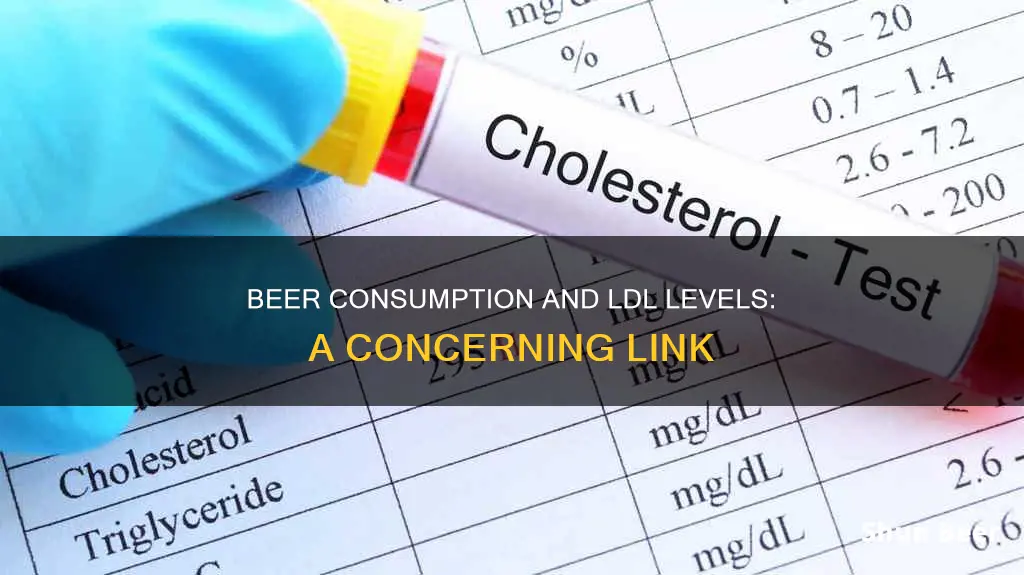
Beer is a staple of the American diet, with 43% of Americans who drink alcohol preferring it over other alcoholic beverages. But what effect does it have on your cholesterol levels?
Cholesterol, a waxy substance that's essential in every cell of your body, can be categorised into two types: HDL (high-density lipoprotein) or good cholesterol, and LDL (low-density lipoprotein) or bad cholesterol. While beer doesn't contain any natural cholesterol, it can still influence your cholesterol levels.
Research suggests that light to moderate alcohol intake may increase HDL levels, while heavy drinking can increase LDL levels, as well as total cholesterol and triglyceride levels. However, the specific effects depend on various factors, including the type and quantity of alcohol consumed, individual genetics, and overall lifestyle.
So, can drinking 6 beers increase your LDL levels? The answer is, it's complicated. While 6 beers may be considered heavy drinking, which is generally associated with higher LDL levels, the specific effects on your LDL levels will depend on a range of individual factors.
| Characteristics | Values |
|---|---|
| Number of beers considered moderate consumption | 1-2 beers a day for males and 1 beer a day for females |
| Effect of moderate consumption on HDL levels | May increase HDL levels |
| Effect of moderate consumption on LDL levels | No effect on LDL levels |
| Effect of heavy consumption on LDL levels | May increase LDL levels |
What You'll Learn

Beer may increase good cholesterol (HDL)
While beer is not typically considered a health drink, it may have some surprising health benefits when consumed in moderation. One of these potential benefits is its positive impact on high-density lipoprotein (HDL) cholesterol, also known as "good" cholesterol.
HDL plays a crucial role in maintaining heart health by trapping and carrying "bad" cholesterol, or low-density lipoprotein (LDL), to the liver for breakdown and elimination. This helps prevent the build-up of LDL cholesterol in the arteries, reducing the risk of coronary artery disease (CAD).
Research has shown that moderate beer consumption can increase HDL levels in the blood. A 2018 study published in Nutrients found that overweight adults who consumed 30 grams of alcohol per day (for males) and 15 grams of alcohol per day (for females) experienced increased HDL levels after four weeks. This amount of alcohol translates to roughly two drinks per day for males and one drink per day for females.
It is important to note that while beer may increase HDL levels, it does not appear to decrease LDL levels. Additionally, excessive alcohol consumption can lead to serious health problems, including high blood pressure, heart disease, stroke, liver disease, and cancer. Therefore, it is essential to drink in moderation and consult with a healthcare professional to understand the risks and benefits of alcohol consumption for your specific situation.
Beer and Tylenol: Safe Mix?
You may want to see also

Beer raises triglyceride levels
Beer is a popular alcoholic drink, but it is important to understand its impact on health. Beer contains carbohydrates and alcohol, which are substances that lead to a quick increase in triglyceride levels. Triglycerides are a type of fat that is included in the total cholesterol count. Ideally, the level of triglycerides in the blood should be below 150 milligrams per deciliter (mg/dL).
When you drink beer, the carbohydrates and alcohol in it cause your triglyceride levels to rise. This is because beer is rich in carbohydrates, which are broken down into sugars during digestion. These sugars are then absorbed into the bloodstream, increasing the amount of triglycerides circulating in the blood. Additionally, the alcohol in beer is processed by the liver, which can lead to the production of more triglycerides.
The effect of beer on triglyceride levels can be even more pronounced in people who are more sensitive to its effects. For these individuals, drinking beer can result in even higher levels of triglycerides in the blood.
While beer does not contain any natural cholesterol, the increase in triglyceride levels caused by drinking beer can still impact your overall cholesterol levels. This is because triglycerides are included in the calculation of total cholesterol, along with HDL (good) cholesterol and LDL (bad) cholesterol. So, when your triglyceride levels rise, your total cholesterol levels also increase.
Research has shown that consuming beer in moderation may have some benefits for heart health. For example, moderate beer intake has been linked to a reduced risk of heart disease and stroke. However, it is important to note that excessive alcohol consumption can lead to serious health issues, including an increased risk of heart disease, liver disease, and certain types of cancer.
To maintain healthy cholesterol levels, it is recommended to follow a healthy diet and lifestyle. This includes limiting alcohol consumption, maintaining a moderate body weight, staying active, and consuming a nutritious diet that is low in simple sugars and alcohol.
Dialysis and Alcohol: Is Beer Safe for Dialysis Patients?
You may want to see also

Heavy drinking increases total cholesterol
Cholesterol is a waxy, fat-like substance that is essential for the body to function. It is produced by the liver and also comes from our diets. There are two types of cholesterol: HDL ("good") cholesterol and LDL ("bad") cholesterol. HDL cholesterol helps to reduce the amount of LDL cholesterol in the body by carrying it to the liver to be broken down and eliminated.
While light to moderate alcohol consumption may have beneficial effects on HDL cholesterol, heavy drinking is associated with higher levels of LDL cholesterol and triglycerides. This is because, as alcohol consumption increases, so does the level of cholesterol in the body.
According to a study of 1,519 people, binge drinking—defined as 8 or more drinks per day for women and 10 or more drinks per day for men—was associated with a 2 to 8-fold increase in the risk of high triglyceride and total cholesterol levels.
The American Heart Association does not recommend drinking alcohol specifically to lower cholesterol or improve heart health. This is because the risks of drinking alcohol outweigh any potential benefits. These risks include an increased risk of some cancers, cirrhosis of the liver, and accidents.
To maintain healthy cholesterol levels, it is recommended to follow a healthy diet and lifestyle, including limiting alcohol consumption, maintaining a moderate body weight, staying active, and eating nutritious foods.
Beer and Vodka: Mixing Alcohol Safely
You may want to see also

Alcohol consumption guidelines
- The National Institute on Alcohol Abuse and Alcoholism (NIAAA) in the United States defines binge drinking as a pattern of drinking that brings the blood alcohol concentration (BAC) to 0.08% or higher. This typically corresponds to consuming 5 or more drinks for men and 4 or more drinks for women in about 2 hours.
- The Substance Abuse and Mental Health Services Administration (SAMHSA) defines binge drinking as consuming 5 or more drinks for males or 4 or more drinks for females on the same occasion, at least once in the past month.
- NIAAA defines heavy drinking as consuming 5 or more drinks on any day or 15 or more drinks per week for men, and 4 or more drinks on any day or 8 or more drinks per week for women.
- SAMHSA defines heavy alcohol use as binge drinking on 5 or more days in the past month.
- According to the Dietary Guidelines for Americans 2020-2025, adults of legal drinking age can choose not to drink or drink in moderation by limiting intake. This means up to 2 drinks per day for men and 1 drink per day for women.
- The CDC recommends that adults of legal drinking age (21 or older) should not drink alcohol or drink in moderation if they choose to drink.
- The National Center for Health Promotion and Disease Prevention recommends no more than 2 drinks per day for males and no more than 1 drink per day for females. For adults aged 65 and older, they advise no more than 1 drink per day, regardless of gender.
- The World Health Organization (WHO) states that "no level of alcohol is safe for our health," and that potential harms begin with the first drop of alcohol consumed.
- The International Agency for Research on Cancer (IARC) has classified alcohol as a Group 1 carcinogen, along with other cancer-causing agents like tobacco.
- Certain individuals should avoid alcohol completely, including those who are pregnant or planning to become pregnant, under the legal drinking age, have certain medical conditions, are taking medications that interact with alcohol, or are recovering from alcohol use disorder.
It is important to note that alcohol consumption guidelines are designed to help individuals make informed choices and reduce potential health risks associated with excessive drinking. However, even moderate drinking may increase the risk of certain health conditions compared to abstaining from alcohol. As always, it is best to consult with a healthcare professional to determine what is suitable for your specific circumstances.
Antidepressants and Alcohol: Is It Safe to Mix?
You may want to see also

Risks of drinking alcohol
Alcohol is a powerful chemical that can have a wide range of adverse effects on almost every part of the body, including the brain, bones, and heart. Drinking too much alcohol, either on a single occasion or over time, can have serious negative consequences for one's health.
Short-term Effects
After consuming 4 to 6 units of alcohol, the brain and nervous system are affected. Specifically, the part of the brain associated with judgment and decision-making is impacted, leading to more reckless and uninhibited behaviour. The alcohol also impairs the cells in the nervous system, causing lightheadedness, slower reaction times, and impaired coordination. As the amount of alcohol consumed increases, so do the negative effects, including slurred speech, blurred vision, nausea, vomiting, and diarrhoea. Consuming more than 12 units of alcohol puts an individual at considerable risk of alcohol poisoning, which can be life-threatening.
Long-term Effects
Drinking large amounts of alcohol over many years can cause extensive damage to the body's organs, including the brain and nervous system, heart, liver, and pancreas. Heavy drinking can also increase blood pressure and cholesterol levels, which are major risk factors for heart attacks and strokes. Additionally, long-term alcohol misuse can weaken the immune system, making individuals more susceptible to serious infections. It can also lead to social implications, such as family break-up and divorce.
Cancer Risks
According to the National Cancer Institute, there is a strong scientific consensus that alcohol consumption can cause several types of cancer. The evidence indicates that the more alcohol a person drinks, the higher their risk of developing alcohol-associated cancer. Even light to moderate drinking can increase a woman's risk of breast cancer by 5% to 15% compared to non-drinkers. Other types of cancer linked to alcohol consumption include head and neck cancer, esophageal cancer, and colorectal cancer.
Cardiovascular Risks
While some studies suggest that low to moderate alcohol consumption may have a positive impact on cholesterol levels and cardiovascular health, the overall risks of drinking alcohol far outweigh any potential benefits. Alcohol consumption is linked to an increased risk of high blood pressure, heart disease, and stroke. Beer, in particular, can increase triglyceride levels, which are part of the total cholesterol count. Therefore, drinking beer can indirectly lead to an increase in total cholesterol levels.
In conclusion, while alcohol consumption may have some potential health benefits, the risks are far more significant and wide-ranging. It is essential to understand and consider the potential dangers when making informed choices about alcohol consumption.
Beer and Health: One Beer, Any Harm?
You may want to see also
Frequently asked questions
Drinking 6 beers is considered heavy drinking and can lead to higher LDL cholesterol levels.
LDL cholesterol is the "bad" type of cholesterol. It contributes to cholesterol buildup in the arteries, causing them to narrow, which can lead to heart disease and other health issues.
According to the Dietary Guidelines for Americans, it is recommended to limit alcohol consumption to two drinks or less per day for men and one drink or less per day for women.
Light to moderate alcohol consumption may increase HDL ("good") cholesterol levels, which can help protect against heart disease. However, heavy drinking can lead to higher LDL cholesterol levels and increase the risk of heart disease.
While beer does not lower LDL cholesterol, moderate consumption may have some benefits for your heart health. Beer can increase HDL cholesterol levels and the flexibility of blood vessels, reducing the risk of coronary artery disease (CAD).







